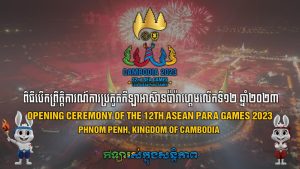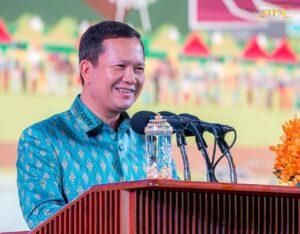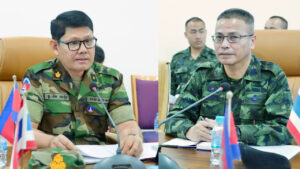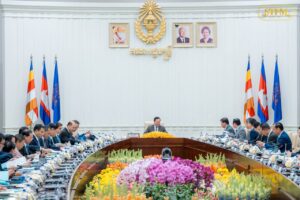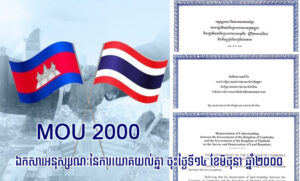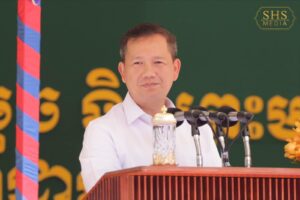Opening Address at the 20th ASEAN Ministerial Meeting on Science, Technology & Innovation under the theme “Artificial Intelligence Application: Navigating the Future” (delivered in English)
- Honorable ASEAN Ministers for Science, Technology and Innovation,
- H.E. Dr. KAO Kim Hourn, Secretary-General of ASEAN,
- Distinguished Delegates of ASEAN and Dialogue Partners,
- Excellencies, Ladies and Gentlemen!
It is indeed my pleasure to open the 20th ASEAN Ministerial Meeting on Science, Technology & Innovation (AMMSTI-20), as Cambodia takes the chairmanship of the portfolio this year. I would also like to extend a warm welcome to all delegates to the beautiful and ancient city of Angkor, a testimony of how science and technology was used to build one of the world wonders and many magnificent monuments that have stood the test of time for the last 1000 years and into the future for the good of humanity.
Science and technology have always been the backbone of humanity’s progress, providing solutions, making our lives better and easier and expanding the scope of what human can do to manage our society, nature and the planet. There have been several waves of technological advancements that have changed the entire landscape of industry, society and human behavior. Thanks to technologies, we have been able to reduce the geographical distance, accelerate and intensify globalization which helps to bring the world closer together and provide more opportunities in terms of knowledge sharing and wealth creation for the world as a whole.
I must say that ASEAN has benefited greatly from globalization supported by the advancement of science and technology, which has transformed the region from a group of mostly newly independent states to one of the centers of growth of the world.
- Excellencies, Ladies and Gentlemen!
As science and technology continue to evolve at breakneck speed, there is a need for the world to harness and critically monitor emerging technologies that are reshaping the world so that we can guide technological progress in a way that prioritizes inclusiveness, sustainable development and resilience.
Among many technologies, this week gathering is a great opportunity for us to delve into the pivotal theme of “AI Application: Navigating the Future.” Fueled by the accumulation and organization of vast amounts of data, AI stands out prominently within the current landscape, alongside advancements in blockchain, quantum computing, data science, machine learning, augmented reality and virtual reality, deep learning, biotechnology and gene editing, and biometric authentication. In fact, AI has become ubiquitous in our lives, as evidenced by simple tasks such as searching for information on smartphones. While presenting many new opportunities, AI also brings forth significant challenges including ethical considerations, inclusivity, transparency, fairness, data privacy concerns, and the need for workforce reskilling.
We, humanity, are in fact entering an uncharted territory that we need to carefully navigate. Today, I would like to highlight two important principles that I think may help guide us through the new challenges and opportunities presented by STI in general, and AI in particular.
Firstly, I want to stress on the need for all STI development to be “people-centric”. While I firmly believe that we hold the right to anticipate technological progress, we too have the responsibility to balance and ensure its net benefit to our humanity. Recent advancements like OpenAI’s Sora, a groundbreaking text-to-video model, or Google’s Gemini, a powerful large language model with various versions catering to different user needs hold immense potential, but require careful consideration and responsible development. Adoption and application of AI should remain within the bounds of ethical consideration and societal values. The general public has expressed fear and concern that their rights and privacy have been infringed by the powerful capability of AI-induced applications.
Without requisite education, skills and continuous engagement, it is nearly impossible now for laymen to differentiate fake news from real one or distinguish artificial generation of graphics from their original ones. In some instance, these developments come at a big cost to the society and government. They put public sentiment and opinion in fragility and could even cause social division, confusion and instability that may hamper social harmony and hard-won peace. Concerns about possible job loss and other challenges have also surfaced among the public.
Adopting a human-centered approach to the use of AI is of the utmost importance and represents a major shift for policymakers, researchers and private entities. The introduction of AI requires in tandem the development of regulatory frameworks to support its progress by integrating contributions from all relevant stakeholders.
This brings me to the second point, namely the importance of the principles of “multilateralism”.
Multilateralism is an effective way to deal with new emerging technologies to ensure that they serve humanity and not the other way around. Multilateralism is important for enhancing efficiency through joint researches, exchanges, joint use of resources, and for creating harmony through shaping frameworks, common platforms and agenda for shared development and progress. Indeed, countries need to compete very hard in acquiring cutting-edge technologies but we also need to ensure that we can still create space for cooperation within our healthy competition. “Decoupling” and “fragmentation” should not become the rules as we run the risk of depleting our limited resources in trying to catch up with different formats and different standards for the same type of technologies.
I believe that ASEAN, which has a long history of multilateral cooperation in STI, should advocate more vocally on the need to adhere to the principle of multilateralism to shape the future of new technologies. The ASEAN STI ecosystem relies heavily on multilateral principles underpinned by stability, peace, equity, sustainability and inclusiveness.
I am encouraged by the progress made under the ASEAN Action Plan on STI 2016-2025 (APASTI 2016-2025). I call on the next APASTI 2026-2035 to pay more attention to equitable access to technology through technology transfer, regional talent development and mobility, strengthening collaboration between STI stakeholders in the region and more investment in innovation-driven research and development.
I sincerely hope that throughout the week, through in-depth discussions and exchanges, we can put forward practical ideas presented on bilateral and multilateral cooperation to accelerate the development of STI for the benefit of humanity. May I wish all participants good health and success in all your endeavors, as well as a very pleasant stay in Siem Reap.
May I now announce the opening of the 20th Ministerial Meeting on Science, Technology and Innovation.
Thank you!

